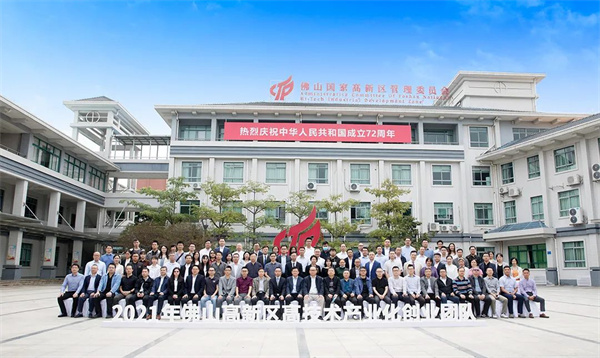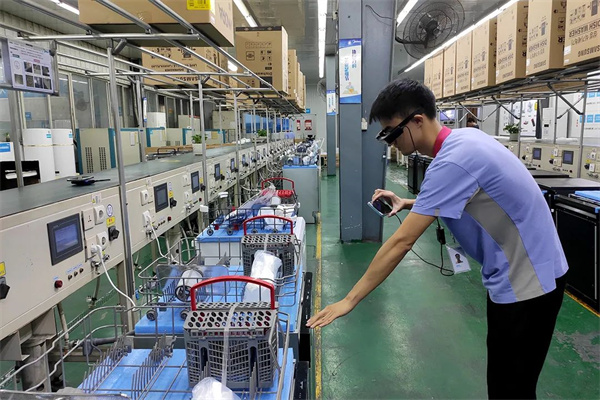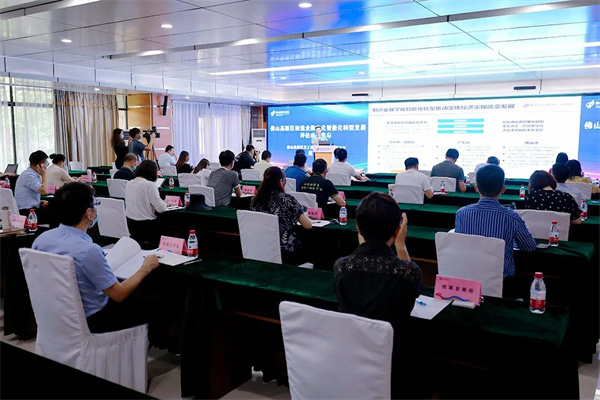Foshan Hi-tech Zone eyes smart home industry cluster
"With funding support, we can accelerate research and development, expand recruitment of talents and plan for future development," said the deputy managing director of Zhongke Weidi Energy Technology Ltd, a smart home enterprise specializing in intelligent HVAC systems for separate buildings. The company was named as one of the 26 Foshan Hi-tech Zone (FHZ) entrepreneurial projects/teams in 2021, which were announced on Oct 27.

After decades of development, Foshan has become one of the most clustered locations for home industries, such as home appliances, furniture and ceramic building materials, with some well-known brands.
In recent years, with continuous technological innovation, investment in research and development and availing to the digital economy, Foshan's home industry has formed a smart home industry cluster featuring rapidly developing subdivided fields, leading technology and huge market potential.
The FHZ is now home to an innovative industry cluster with home appliances, sanitary ceramic and furniture as its mainstay and supplemented with characteristic industries like intelligent lighting, door locks and security monitoring. These industries are further supported by scientific research institutes, industrial internet platforms and smart manufacturing service platforms.
The FHZ's smart home industry cluster was approved as a national pilot innovative industry cluster, according to the Torch Center of the Ministry of Science and Technology (MOST).
New models and business forms emerging

Dishwashers with smart Wi-Fi systems made by Midea Washing Appliance Manufacturing Ltd Co can provide real-time status checks, free of time and space limitations. The company's AI-chipped kitchen ventilators can reduce noise automatically for a quieter cooking environment.
The company's production workshops started their digital transformation in 2017. Now the output has doubled with the same production area and staff, the product delivery cycle has been shortened from 60 days to 30 days, and overall operation costs have decreased by 10 to 15 percent.
The development of Midea Washing Appliance epitomized the smart home industry cluster development in the FHZ.
As one of the earliest industries rising from Foshan, the generic home industry has developed a number of signature enterprises that enjoy international reputations.
In 2020, the total industrial output value of Foshan's pan-home industry exceeded 1 trillion yuan ($156.95 billion). However, in the process of upgrading the manufacturing industry from focusing on scale to focusing on quality, the disadvantages of a large-but-not-strong pan-home industry were exposed and needed innovation for its transformation to a higher end industry.
"Development focused on sci-tech innovation and industrial upgrading has yielded the smart home industry," said Pan Dongshen, director of the zone's management committee. Some leading pan-home enterprises have started exploring the in-depth integration of big data and the manufacturing industry, worked on intelligent production processes, fully used the various innovation resources clustered at the FHZ, and achieved a great deal in promoting an intelligent, digital, personalized and green industry.
Eyeing industry clustering
"The FHZ's smart home industry has the highest level of digitalization. Nineteen percent of smart home enterprises have reached an excellent level of digitalization, much higher than other industry categories," said Wang Hongling, vice-president of the China Academy of Information and Communications Technology's Guangzhou branch.
The "excellent" performance comes from active exploration toward a smarter and more high-end industry. Priority was given to developing high-end equipment manufacturing, smart home and new materials industry clusters, which were included in the zone's five-year development plan.
Meanwhile, the zone maximized the benefits of financial funds, guided enterprises to expand investment in innovation and research, improved policy support, piloted China's first enterprise innovation credit system , and guided innovation resources flowing to sci-tech-based small- and medium-sized enterprises to foster Foshan's smart home industry cluster development.
The establishment of public service platforms such as the Ji Hua Laboratory has provided strong technological support to the smart home industry. At present, there are 77 research institutes, 26 provincial new R&D institutions, 192 innovation service institutions, and 206 enterprise technology centers in the cluster.
Aiming for no less than 10 application scenarios

Last August, the FHZ started identification of the 2021 pilot demonstration project for cutting-edge technology application scenarios. A key part of the job was to promote the comprehensive transformation and upgrading of intelligent, digital and networked manufacturing by clustered enterprises.
"By 2023, the FHZ will build no less than 10 application scenarios in the smart home field. We will develop a group of demonstration smart factories, promote green manufacturing and incubate a group of green manufacturing projects at the national and provincial levels," Pan said.
In 2020, the FHZ's smart home industry cluster achieved a total industrial output value of 133 billion yuan. The cluster houses 479 enterprises, 395 of which are high and new tech enterprises. There are more than 130 supporting service institutions and organizations in the zone.
